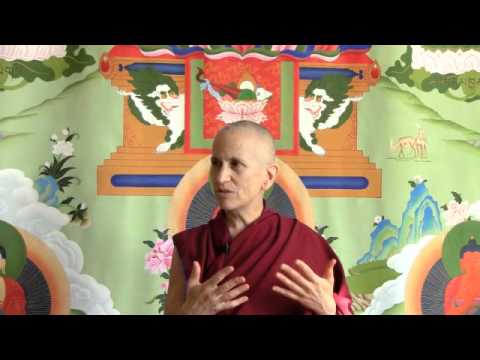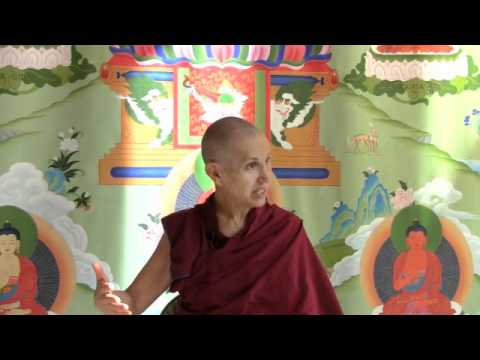The four distortions: Subtle impermanence
A Bodhisattva’s Breakfast Corner talk on the Four Truths of the Aryas taught by Shakyamuni Buddha, also known as the Four Noble Truths.
Yesterday we were talking about gross impermanence—the fact that things break and people die—and how we know this intellectually, yet when it happens, we’re so totally surprised by it!
Below this level of gross impermanence is subtle impermanence; or maybe we should say that gross impermanence exists because things are subtly impermanent. In other words, you’re born and you die, and death is the gross change; birth is, too. But why is it that we go from birth to death? It’s because aging is happening every single moment. It’s not that we stay fixed in a permanent state and then all of a sudden—wham—we die from it. In the same way, his Holiness uses the example that the sun rises and then it sets, and its setting happens because from the time of its rising each moment it was moving.
Subtle impermanence is not that things are moving each moment but that they’re coming into existence and going out of existence in each moment. So, things don’t exist for a second moment, and there’s no other cause that needs to act upon something to get it to change. Just the fact that something arises—just this fact—is enough to make it go out of existence. We usually think something arises, it’s fixed, and then another cause comes along and—whammo—breaks it. No! I mean, that may be how it appears on the gross level, but actually, why is that happening? It is because something doesn’t exist for a second moment, at all.
The gross impermanence is just something we happen to notice on a gross level, but, in fact, every single moment things are arising and ceasing, arising and ceasing, arising and ceasing. This subtle impermanence is realized only through meditation. We can’t see it with our eyes; however, having an awareness of it, even on a conceptual level, really changes the way we look at life. Even having an awareness of gross impermanence, like our own death, on a conceptual level changes how we live. So, can you imagine having an awareness of subtle impermanence through direct perception, where you’re able to, on a subtle level, see things arising and ceasing each moment without any further cause acting upon them? Their own arising is the cause for their ceasing.
When you see this, it becomes really evident how samsara is unstable because everything in samsara is an aggregate; ourselves and the entire world around us is arising and ceasing, all the time, and there’s no way to stop it. It’s not like somebody presses the button and makes things arise and cease. We can’t press a button and make it all stop. It’s just the nature of conventional things that they arise and cease in each moment. So, they’re unstable.
When we talk about it this way, then impermanence is a reason for the things to be in the nature of duhkha, because there’s nothing in samsara we can count on; it’s all subtly impermanent. The Buddha’s qualities are also arising and ceasing in each moment, like the Buddha’s generosity and wisdom. All those are conditioned phenomena that arise and cease each moment, but because they’re not arising and ceasing under the influence of ignorance, they’re much more reliable.
Questions and Answers
Audience: The arising and ceasing are simultaneous?
Venerable Thubten Chodron (VTC): Yes.
Audience: Simultaneous?
VTC: Simultaneous! It sounds weird, you know, that arising and ceasing are occurring simultaneously. We usually think that they’re opposite—first it arises, then it stays for a while, and then it goes out of existence. But if you posit like that, then you’re throwing some permanence in there. Permanence means it arises, stays the same (even for a split second), and then it ceases. But it is not like that. It’s arising and ceasing at the very same moment. In the process of arising, it’s changing into something else. So, really think about it. It’s quite potent to think about it.
Audience: What about the verb “abiding.” Is abiding also impermanent?
VTC: A few people in the Vaibhasika say that is so, but everybody else says, “No, there is not even abiding.” On a gross level, we talk about abiding, but if you really examine what that means, it’s actually going out of existence.
Audience: When we talk about arising, that moment of arising is just something that we label. There’s no actual arising that came out of nowhere. So, through a chain of events, some thing that we label, is that when it arises, when we label it? Not that by labeling it we create it…but arising seems very solid.
VTC: Arising seems solid until you start to ask, “What is arising really?” And you try to find an exact moment in which something arises. That’s when you’re really getting into the investigation of emptiness because you see that there is no moment that you can find where something actually arises. And that gets into Nagarjuna’s whole idea of, “Does something arise from self, other, both or causelessly?”
They’re always talking about gardening, about seeds and sprouts; it’s an analogy for suffering, how suffering originates. We have this feeling like there’s a seed and then there’s one moment when the seed becomes a sprout, and you can draw a very clear line. Below this it’s a seed, above that it’s a sprout. That’s conceptually how we think of it, but when you look at that, can you draw a line between the seed and the sprout? Can you draw a definitive line, and say this is actually when the arising occurs? You can’t!
When you start analyzing like this, it’s kind of mysterious how something arises. And then you see how our conceptions put everything into little boxes. And that creates a lot of the difficulty. You can see in our world how we do this. When you go to the airport and they’re scheduling the time that a flight arrives or lands, there is a line there. Or when they’re timing things—oh, the Olympics are really good! When you’re timing how fast somebody is swimming, there is this line, and what was it? Some guy one hundredth of a second touches the wall before the other guy does, so he’s the winner! We divide time; this exact moment is when he touched the wall. But when you start looking at that, can you really find an exact moment when he touched the wall? You can’t really find it.
Today is my birthday! So, when did I become 61? Was it at midnight? Or was it 11:11 Chicago time (which was the time I was born)? But at 11:11 Chicago time at which point? That’s a whole minute, there’s a long time in there! Is that when the crown started to show? I mean, at what time were you born? When you crown? Or when the whole body comes out? Or when they whack you, or when they cut the umbilical cord? What is the actual time that is recorded? So, we make—on a conventional level—all these discriminations and fix them, but when we really examine it, it gets a little dicey. And so we think, which moment made me turn 61? Was it the last moment of yesterday, at 11:59:59? Or was it today at 11:10:59? Was it the one second that makes you turn 61? But how can one second make you turn a whole year? Or was it the first moment after 60 that you start becoming 61? But you’re still 60 then, you’re not 61 then. So, which moment is it that makes it a year? [laughter]
Venerable Thubten Chodron
Venerable Chodron emphasizes the practical application of Buddha’s teachings in our daily lives and is especially skilled at explaining them in ways easily understood and practiced by Westerners. She is well known for her warm, humorous, and lucid teachings. She was ordained as a Buddhist nun in 1977 by Kyabje Ling Rinpoche in Dharamsala, India, and in 1986 she received bhikshuni (full) ordination in Taiwan. Read her full bio.


